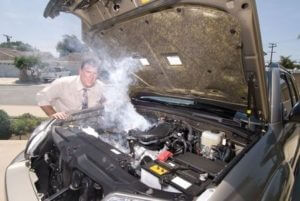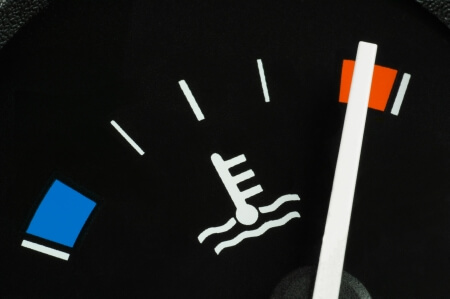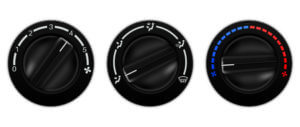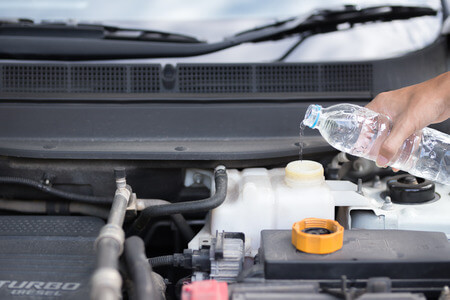What to do if your car overheats

Don’t make these mistakes if your car overheats
Do a search for “What to do if your car overheats” and

If your car overheats, pull over and call a tow truck
you’ll find all advice I list below in the “Things NOT to do if your car overheats.” I see these bits of really bad advice all the time and the people who write this advice really don’t understand the damage that can occur with modern engines. Obviously, the advice is based on the fact that the person is stranded and wants to get home or to their destination. But there are other ways to accomplish that goal without risking major engine damage. In all instances listed below, a tow is ALWAYS the cheaper alternative to the possible engine damage. The other problem with the advice you find online is that it’s really outdated. It made some sense back in the days when all engines and cylinder heads were built out of cast iron and the radiator fan was driven by a fan belt.
But modern engines are made from aluminum alloys and just a single incident of overheating can cause the cylinder head to warp, causing a head gasket failure. A head gasket failure caused by overheating is a major repair, costing from $1,200 to as much as $2,500. If you follow the bad advice below, you risk turning a fairly minor repair into a major repair. Instead here’s what to do if your car overheats: pull over IMMEDIATELY and shut off your engine. Call a tow truck and have your car towed to your home or a shop.
Avoid these mistakes if your car overheats
Driving with your blower fan on high to compensate for overheating
You turn on you heater blower motor thinking it’ll remove heat from the engine coolant. That’s true as far as it goes. But here’s the problem.

Turning the blower fan to high won’t help
Coolant only circulates through your heater core when the engine is running. If you have a coolant leak from a bad radiator or leaking hose and that leak caused the overheating condition, continuing to drive or pulling over running your engine with the blower motor on high will accomplish NOTHING! The engine will continue to generate heat and the coolant level will still be too low. In fact, there might not be any coolant in your heater core.
If the cause of the overheating is a plugged radiator, broken belt or bad water pump, continuing to drive or run your engine will generate FAR more heat than the heater core can possibly remove even under the best of circumstances.
Pull over, wait for the engine to cool and then start driving again
This advice will make you feel really good. You pull over and shut off the engine. You pop the hood and let the engine cool off. After about 40-mins, you fire up the engine and drive until it overheats again. You repeat this process until you get home and think you’ve avoided a repair bill. WRONG.
The biggest problem with this advice is that you really don’t know if you’ve caused head gasket damage from the first overheating condition. Plus, you really don’t know exactly when to pull over and stop on the repeat overheat events. Do you wait until the needle is at the top of the gauge before pulling over? Or, is it ok to keep driving when the needle is in the middle of the red zone? Because driving in the middle of the red zone AFTER THE FIRST OVERHEATING EVENT may be the equivalent of driving at the top of the red zone due to damage caused from the first overheating event.
This advice is bad is a second area as well. If you caused head gasket damage from the first engine overheating event and combustion gasses leak into the cooling system, the car will overheat MUCH faster when you start driving again.
If the head gasket failed between an oil and a coolant passage, coolant can seep into the crankcase during the cool down period. If you’re unaware of that and start up the engine with coolant in the crankcase, the oil/coolant mix can destroy the engine bearings and piston ring,s turning the damage from an expensive head gasket replacement into a total engine replacement. In that case, you’ve gone from a $2,000 repair to a $4,000 repair—or more.
Pull over, let the engine cool and add water before driving again
The theory here is that the first overheating event

Adding water to compensate for a cooling system leak and overheating and then driving again is RISKY!
was cause by a low coolant level due to a radiator, radiator/heater hose or heater core leak or a water pump leak. Pulling over, letting the engine cool and refilling with water may allow you to limp home so you can correct the underlying problem yourself and save the cost of a tow.
A cooling system leak is fairly easy to fix, so this advice makes sense to most people. And it can work to get you home. If you’re handy, doing the water trick gets you home where you can fix a radiator/heater hose, belt or water pump for less than $200.
So you save the cost of a tow, but risk catastrophic engine damage. Sorry kids, saving the cost of a $150 tow back to your home versus possible engine damage in the $2,000 to $4,000 range makes NO sense at all.
In each case listed above, what you’ve done is turned a single incident of engine overheating into multiple incidents of cooling/overheating events—the worst possible thing you can do!
Those extreme overheating and cool-down events expose the head gasket to the worst kind of abuse. One overheating event is bad enough and can cause the gasket to fail, but multiple overheating events is sure to cause the gasket to fail.
Here’s what to do if your car overheats
Pull over immediately. Open the hood. Turn on your hazard flashers to warn other drivers. Call for a tow to get your car back home or nearest repair shop. Getting towed is the single best way to avoid major engine damage. The cost of the tow is minuscule compared to a major head gasket repair or total engine failure.

Call a tow truck. Then call a cab, Uber or Lyft to get home
Get yourself home by calling a cab, Uber or Lyft.
So it comes down to this simple answer to the question of what to do if your car overheats:
Call a tow truck and a taxi. Have your car towed to your house or a repair shop. Do NOT try limping home by adding water or pulling over to let the engine cool. It’s simply too risky. If your risk doesn’t pay off and you wind up needing a head gasket repair or a new engine, you’ll regret not spending the money for a tow.
©, Rick Muscoplat
Posted on by Rick Muscoplat
